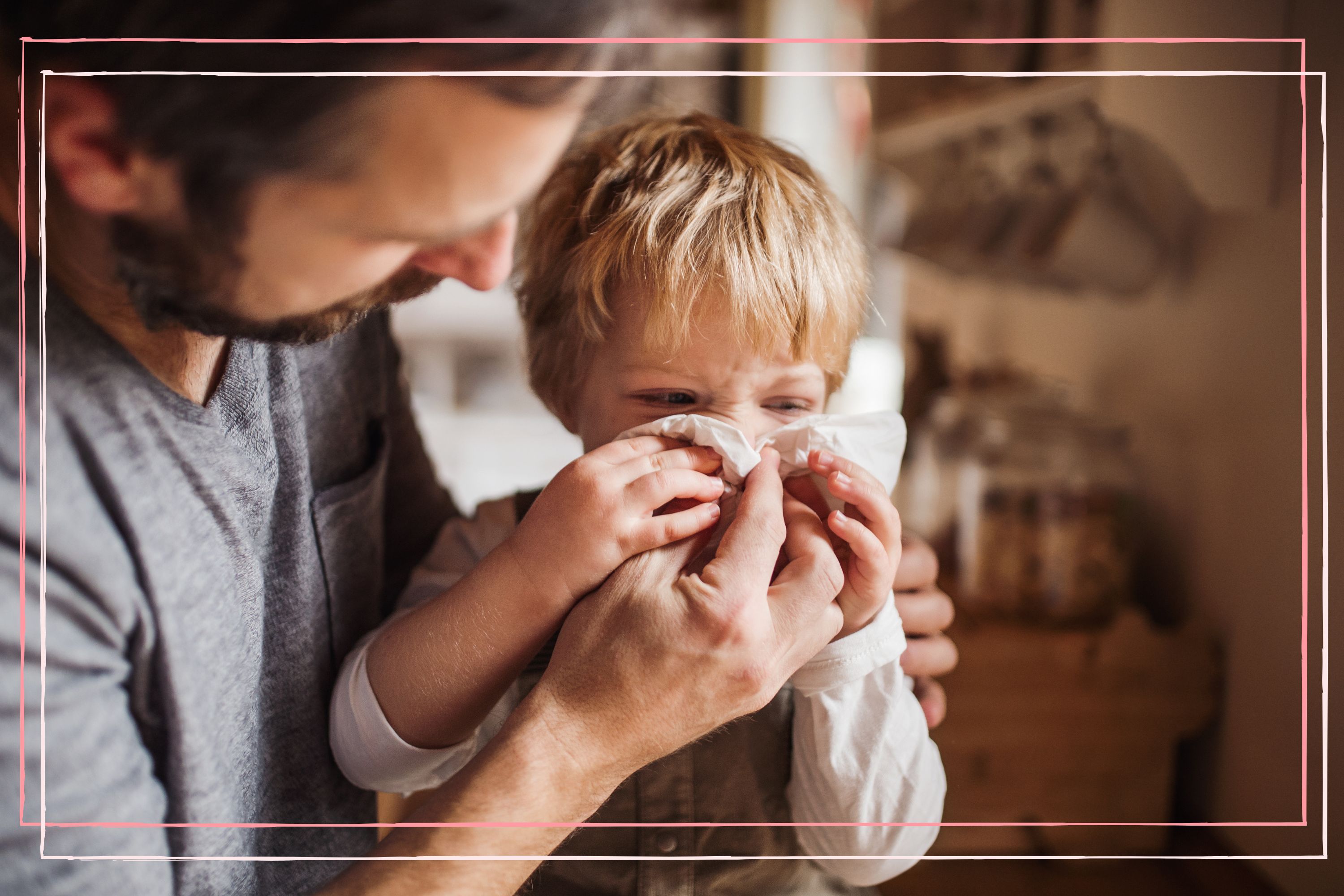What doctors want you to know about soothing and preventing coughs and colds in babies and children
Coughs and colds in babies and children are very common. Here, GPs explain how to help your child with a cold and cough at home, if they can still go to daycare and when you should see a doctor.

Coughs and colds are sadly part and parcel of parenting small children - and sometimes it can feel like you’re in a never-ending cycle of germs.
These viruses can disrupt a baby or toddler’s sleep, their eating patterns, and make them pretty miserable; but luckily, they are rarely serious or long-lasting. You might find that once your child starts at nursery, or in another childcare setting, they frequently become ill with more bugs. This is frustrating but also completely normal because they are mixing with other children and being exposed to new germs.
We consulted NHS GP Dr Hana Patel (FRCGP) and GP Dr Alexis Missick (MRCGP), who also works with UK Meds, to find out how you can help soothe coughs and colds in babies and children, and if there is any way of preventing these common bugs.
The information in this article is for general purposes only and does not take the place of medical advice. It is essential to be guided by your GP and take note of official NHS advice. You should immediately seek medical attention if symptoms worsen or you are concerned about your child.
How common are coughs and colds in babies and children?
Coughs and colds are extremely common in babies and toddlers. Dr Patel says, "over the first year of life, your child is likely to have up to eight of these episodes. Coughing is the body's natural way of clearing infection."
Dr Patel explains that coughs and colds in babies are so common because, "there are hundreds of different cold viruses and young children have no immunity to any of them as they have never had them before. Over time, they gradually build up immunity and get fewer colds."
The more your child comes into contact with people, the more exposed they are to germs. Coughs and colds are spread by droplets which will be found in the air, in public, in childcare settings, or in the family home. Plus, if a baby has an older sibling who is mixing with lots of children at school or nursery, they may also catch viruses brought home by them.
Parenting advice, hot topics, best buys and family finance tips delivered straight to your inbox.
Colds tend to come on gradually. Babies may have a stuffy nose and mild temperature and will probably sleep more. They may also go off their feeds, both because they feel unwell and because their stuffy nose makes feeding difficult.
Can coughs and colds in babies and children be treated at home?
Yes, coughs and colds in babies and children can usually be treated at home, and Dr Patel says most colds will get better in five to seven days, but can take up to two weeks in small children because their immune systems are still developing.
It’s unlikely that your child will need to see a GP if they have a cold, however, if your child has a cough which isn’t going away on its own then you should see your GP who will be able to check if they have a chest infection and need antibiotics.
Dr Missick says you should see your GP if a baby under three months has a fever of 38 degree or above, or 39 degrees in an infant aged three to six months.
How can I ease my child’s cough and cold symptoms?
A baby or toddler who is feeling unwell is likely to be feeling fussy and irritable. They’ll need lots of cuddles, rest and quiet time. Coughs and colds in babies and children usually make them clingy and can make them fretful. They may want to stay close and may wake more often at night needing comfort. If they refuse feeds because their nose is blocked, you can try to unblock their nose by very gently syringing out the mucus. Ask your chemist for the right product to do this. If possible, feed on demand, little and often, making sure they get plenty of fluids to avoid dehydration.
Dr Patel also recommends making sure your child drinks plenty of fluids and encouraging the whole family to wash their hands regularly to stop the cold from spreading.
You can buy over-the-counter nasal saline sprays to clear congestion and give infant paracetamol if they have a temperature. “If your child has earache, with or without a high temperature, you can give them infant paracetamol or ibuprofen at the recommended dose,” Dr Patel advised. She also adds that it’s worth trying different medicines to see which has the best effect on your child. Your pharmacist or family doctor will be able to advise you on the appropriate medication for your baby.
Dr Missick adds, "Coughs and colds can be treated at home with regular anti-fever medication like Calpol (paracetamol) or Motrin (ibuprofen) which will also help with main symptoms.
"Saline drops or sprays can help with nasal congestion making it easier to breathe and swallow especially in infants. Even using a decongestant oil like Olbas oil or eucalyptus oil on clothing, clothes, diffusers and in bathtubs can help with the congestion," she adds.
Your child may also need some longer naps and extra milk if they’re not eating full meals while they’re under the weather.
Does my child need to be kept home from nursery if they have a cough and cold?
Whether or not your child can go to nursery or go to school with a cold or cough will depend on your daycare or nursery's rules and also will depend on how ill your child is and whether they have a temperature or not.
Dr Patel says, “The gov.uk and NHS advice regarding this, is that it is fine to send your child to school or nursery with a minor cough or common cold if they are otherwise well and do not have a high temperature. But if your child has a fever, they should stay home from school or nursery until they feel better, and the fever has resolved.”
Dr Missick says that while it will depend on your nursery or school, if you can keep your child at home, this could be helpful: "while it can be a challenge for parents to have the child at home, it is useful for nurseries because it helps to reduce the spread.
"Little ones are less likely to cough and sneeze into tissues and elbows, they share the same toys and most are very friendly, hugging their mates often even when unwell. All of these things increase the chances of spreading a virus that is easily transmissible."
How do you know it's just a cold and not flu?
It can be hard to distinguish colds from flu, particularly in winter, when both are common. Flu symptoms are usually more severe than colds, although this varies from case to case. Unlike colds that tend to come on gradually, flu tends to start suddenly, with a higher body temperature, and leaves a child feeling extremely weak.
Whenever you have a viral illness, such as a cold or flu, you're more prone to getting a second bacterial infection on top of it. This may cause a chest or ear infection, sinusitis or tonsillitis. These can occur without a cold and may also be caused by viruses - all this can make it quite hard to know exactly what it is your child is suffering from.
The NHS advises phoning your GP or 111 if:
- Your baby is less than 3 months old and has a temperature of 38 °C or above
- Your child is aged 3 months or older and has a temperature of 39 °C or above
- Your baby or child has fewer wet nappies, nappies that seem drier than usual, or a dry nappy for 12 hours or more
- Your baby’s having difficulty feeding
- Your baby’s taking less than half their usual amount during their last 2 or 3 feeds
- You think your baby may have coronavirus (COVID-19) symptoms
If your baby or child is unwell and you're worried, or their cough and cold symptoms do not improve after a few days, trust your instincts and always speak to your GP.
Parents should always follow the NHS advice about getting to know their baby. If you are worried about your baby, a rash that has appeared, or you notice a change in their behaviour - such as not feeding well, being very sleepy, or very irritable - contact your GP or midwife immediately.
Is there anything you can do to prevent coughs and colds?
As coughs and colds are so common, it would be tricky to prevent your child from ever catching one. However, there are a few things you can do to try and keep your family as healthy as possible, especially during seasons of colder weather. Dr Missick says winter is the worst time for these types of illnesses because people stay inside more which means the germs can spread easily and they also thrive in colder weather. She recommends:
- Ventilating spaces if you don’t want to go out in the cold with your baby.
- Maintain good hygiene methods by washing your hands, and your baby’s, regularly.
- Try to limit contact with adults and other children who are ill.
GPs answer your frequently asked questions about coughs and colds in babies and children
How long does a cough and cold last in infants?
As Dr Patel says above, a cough or cold can last up to two weeks for a young child. If a cough lasts longer than this then you should speak to your GP.
How can I help my baby with a cold and cough?
Speak to your GP or a pharmacist about which medicines are suitable for babies and infants. Give them lots of attention and care, making sure your child drinks plenty of fluids, and keep a close eye on their symptoms in case they worsen.
Which food is good for colds and coughs for babies?
Dr Missick recommends cool food and drinks, light meals like yogurts, and mashed potatoes which can be easier on the tummy but provide some nourishment when appetite is reduced. “Smaller meals and drinks often are better managed,” she explains.
Can my baby or toddler go to nursery if they have a cough or cold?
A parent will know if their child is well enough to go to nursery or not but if they have a temperature they should stay at home.
NHS advice regarding this, is that it is fine to send your child to school or nursery with a minor cough or common cold if they are otherwise well and do not have a high temperature.
However, if your child has a fever, they should stay home from school or nursery until they feel better, and the fever has resolved.
The information on GoodTo.com does not constitute medical or other health advice or diagnosis and should not be used as such. Although GoodtoKnow consults a range of medical experts to create and fact-check content, this information is for general purposes only and does not take the place of medical advice. Always seek the guidance of a qualified health professional or seek urgent medical attention if needed.
Our experts

Dr Hana Patel is a versatile and experienced general practitioner in family medicine, and a life and mental health coach based in the Southeast London area. She first received her medical degree in 2005 from The University of London, and continued to further her medical qualifications through rigorous trainings and degrees. Dr Patel has trained with institutions such as King's College London, University of London, and University of Kent. In 2010, she received her qualification from The Royal College of General Practitioners (RCGP).

Alexis is an experienced General Practitioner (GP) having worked over 10 years in the NHS and 6 years internationally, mostly the Caribbean - namely Turks and Caicos where she is originally from. Alexis' approach in general practice is to holistically treat and empower patients via patient education, to share in their journey to better physical health.

Kat has been a digital journalist for over 15 years after starting her career at Sky News where she covered everything from terror attacks to royal babies and celebrity deaths. She has been working freelance for the last five years and regularly contributes to UK publications including Stylist, ES Best, Woman&Home, Metro and more.
